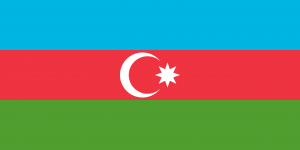Language/North-azerbaijani/Grammar/Present-Tense
As a North Azerbaijani language teacher, I am happy to guide you through the fascinating world of Azerbaijani grammar. In this lesson, we will be learning about the present tense in North Azerbaijani, including how to form and use regular and irregular verbs.
First, let's start with some cultural information about the Azerbaijani language.
Azerbaijani is the official language of Azerbaijan, spoken by approximately 92% of the population. It is also spoken in Iran, Russia, and Georgia. Azerbaijani has two main dialects, North Azerbaijani and South Azerbaijani, with North Azerbaijani being spoken in Azerbaijan and Russia, and South Azerbaijani being spoken in Iran.
Azerbaijani belongs to the Turkic language family, which also includes Turkish, Uzbek, Kazakh, and Kyrgyz. It has a unique grammar and phonology system, so it may take some time to get used to. However, don't let this discourage you! Learning a new language is always a rewarding experience.
Now, let's dive into the present tense in North Azerbaijani.
Forming the Present Tense
The present tense in North Azerbaijani is formed by adding the suffixes "-mir", "-sin", "-dir", "-ik", "-siniz", and "-dirlər" to the verb stem. The verb stem is the part of the verb that does not change, and it is usually the infinitive without the suffix "-maq". Here is an example:
| North Azerbaijani | Pronunciation | English |
|---|---|---|
| açmaq (to open) | atchmak | to open |
To form the present tense of this verb, we remove the "-maq" suffix to get the verb stem "aç", and then add the appropriate present tense suffix based on the subject. For example:
| North Azerbaijani | Pronunciation | English |
|---|---|---|
| Mən açıram | men atchiram | I open |
| Sən açırsan | sen atchirsin | You open (singular) |
| O açır | o atchir | He/She/It opens |
| Biz açırıq | biz atchiriq | We open |
| Siz açırsınız | siz atchirsiniz | You open (plural) |
| Onlar açırlar | onlar atchirlər | They open |
As you can see, the verb stem "aç" remains the same, and we simply add the appropriate present tense suffix based on the subject of the sentence.
Note that for some verbs, such as those ending in "-gelmək" (to come) or "-getmək" (to bring), the present tense suffixes may attach to the "-l" of the stem instead of the stem itself. For example:
| North Azerbaijani | Pronunciation | English |
|---|---|---|
| gəlmək (to come) | gellmek | to come |
| Biz gəlirik | biz gellirik | We come |
Using the Present Tense
Now that we know how to form the present tense, let's look at how to use it in sentences. The present tense is commonly used to describe actions that are happening now, habitual actions, and general truths.
Here are some examples:
- Mən evdəyəm. (I am at home.) - Siz hər gün kitab oxuyursunuz. (You read a book every day.) - Güneş doğur. (The sun rises.)
In the first sentence, the present tense is used to describe the speaker's current location. In the second sentence, the present tense is used to describe a habitual action (reading a book every day). In the third sentence, the present tense is used to express a general truth (the sun always rises).
It is important to note that in North Azerbaijani, there is no separate present continuous tense like in English ("I am reading"). Instead, the present tense can be used to describe actions that are happening now as well as habitual actions.
Regular and Irregular Verbs
In North Azerbaijani, there are regular and irregular verbs, just like in English. Regular verbs follow a predictable pattern when forming the present tense, while irregular verbs do not.
Let's take a look at some examples:
Regular Verbs
Regular verbs in North Azerbaijani are those that follow the standard "-mir", "-sin", "-dir", "-ik", "-siniz", and "-dirlər" pattern. Here are some examples of present tense regular verbs:
| North Azerbaijani | Pronunciation | English |
|---|---|---|
| yoxlamaq (to check) | yoxlamak | to check |
| Mən yoxlayıram | men yoxlayiram | I check |
| Siz yoxlayırsınız | siz yoxlayirsiniz | You check (plural) |
Irregular Verbs
Irregular verbs in North Azerbaijani are those that do not follow the standard "-mir", "-sin", "-dir", "-ik", "-siniz", and "-dirlər" pattern. Some of the most common irregular verbs in North Azerbaijani include:
- Bilmək (to know) - Görmək (to see) - Olmaq (to be)
Here are some examples of present tense irregular verbs:
| North Azerbaijani | Pronunciation | English |
|---|---|---|
| bilmək (to know) | bilmek | to know |
| Mən bilirəm | men bilirem | I know |
| Siz bilirsiniz | siz bilirsiniz | You know (plural) |
| görmək (to see) | gormek | to see |
| O görür | o gorur | He/She/It sees |
| Biz görərik | biz gorerik | We see |
| olmaq (to be) | olmak | to be |
| Siz olduğuz | siz olduguz | You are (plural) |
As you can see, irregular verbs have unique present tense forms that do not follow the standard pattern. It is important to memorize these irregular verbs as they are commonly used in everyday conversation.
Conclusion
In conclusion, the present tense in North Azerbaijani is formed by adding the appropriate suffix to the verb stem, which is usually the infinitive without the "-maq" suffix. The present tense is commonly used to describe actions that are happening now, habitual actions, and general truths. There are regular and irregular verbs in North Azerbaijani, and it is important to memorize the present tense forms of both.
I hope you found this lesson helpful in your North Azerbaijani language learning journey. Keep practicing and don't give up! If you have any questions, feel free to reach out to me.


